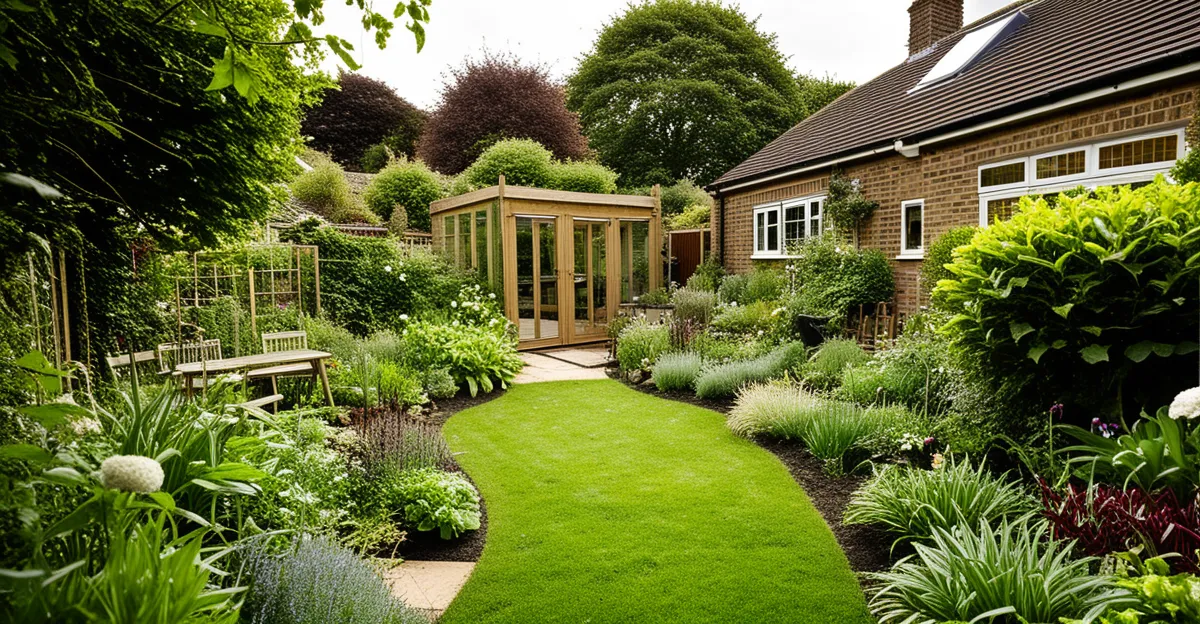Essential Steps for Starting an Eco-Friendly Garden in the UK
Creating an eco-friendly garden UK starts with careful preparation and a focus on sustainability. First, assess your garden’s soil and local climate to select appropriate plants and design elements that thrive naturally. This approach reduces water use and the need for chemical inputs, which supports a healthy environment.
Adapting sustainable garden setup methods to the UK climate means accounting for its often cool, damp conditions. Choosing hardy, native plants reduces maintenance and supports biodiversity. Furthermore, sourcing materials responsibly within the UK minimizes carbon footprint and supports local suppliers. This includes selecting organic compost, untreated wood, and recycled materials whenever possible.
In parallel : How Can You Transform Your Home Interior with Minimal Effort?
UK gardeners should also implement practical UK gardening tips such as improving soil health with natural amendments and planning crop rotations to maintain fertility. Embracing these steps fosters a resilient, eco-friendly garden that benefits both the gardener and local ecosystems without relying on harmful chemicals or excessive resources.
Essential Steps for Starting an Eco-Friendly Garden in the UK
Starting an eco-friendly gardening UK project requires preparing your space with sustainability as the priority. Choose plants and materials that suit the UK’s often cool, damp climate, reducing resource waste and environmental impact. Sustainable garden setup begins by evaluating your garden’s sunlight, soil types, and moisture levels, which helps select species and garden features adapted for longevity and minimal intervention.
Have you seen this : How Can You Transform Your UK Home into a Cozy Sanctuary This Winter?
Adapting eco-friendly practices to the UK climate means focusing on hardy, native plants known to thrive with less water and no chemical fertilisers. Incorporate natural pest control methods and organic mulching to maintain soil health and conserve moisture. Implementing UK gardening tips such as rainwater harvesting or mulching can further support sustainability by reducing water use.
Sourcing plants and materials responsibly in the UK is crucial. Opt for local nurseries providing native species and organic compost, which lowers your garden’s carbon footprint and promotes biodiversity. Use recycled garden materials like reclaimed wood or stone for paths and beds to minimise waste. Together, these essential steps ensure your garden remains sustainable, functional, and eco-conscious within the unique UK environment.
Essential Steps for Starting an Eco-Friendly Garden in the UK
Starting an eco-friendly gardening UK project demands thoughtful preparation to ensure a truly sustainable garden setup. Begin by assessing your garden’s specific conditions, including soil quality, sunlight, and drainage. This foundational step helps tailor sustainable choices that thrive naturally in the UK’s variable climate. Incorporating UK gardening tips like crop rotation and organic mulching boosts soil health and reduces dependency on chemical inputs.
Adapting eco-friendly practices to the UK environment means favouring hardy, native plants that cope well with the region’s cool, damp weather. Such plants require less watering and fertilizers, fitting the ethos of eco-friendly gardening UK by minimizing resource use. Additionally, natural pest control methods and companion planting can manage garden pests without resorting to harmful chemicals.
Sourcing materials and plants responsibly is essential. Choose local nurseries that supply native species and organic compost to reduce transportation emissions. Using recycled garden materials and sustainable alternatives further supports a low-impact garden setup. Prioritising these steps ensures your garden contributes positively to both biodiversity and sustainability within UK landscapes.
Essential Steps for Starting an Eco-Friendly Garden in the UK
Starting your eco-friendly gardening UK journey involves preparing your garden space with sustainability at its core. Begin by evaluating soil health and sunlight patterns to plan a sustainable garden setup suited to the UK’s climate. Adapting to frequent damp and cooler weather means choosing plants that thrive naturally, reducing water and fertilizer needs. Incorporate UK gardening tips such as mulching to conserve moisture and improve soil fertility without chemicals.
Sourcing plants and materials responsibly within the UK significantly lowers the garden’s environmental impact. Opt for native plant species from local nurseries to support regional ecosystems and biodiversity. Select organic compost and avoid peat-based products, which helps preserve natural habitats. Use recycled garden materials—for example, reclaimed wood or stone—for paths and borders to promote eco-friendly landscaping.
Integrating these steps ensures your garden is both sustainable and well-adapted to UK conditions. Thoughtful choices in preparation, plant selection, and material sourcing form the foundation of successful eco-friendly gardening in the UK, enabling a garden that supports nature while being resilient and low-maintenance.
Essential Steps for Starting an Eco-Friendly Garden in the UK
Creating a successful eco-friendly gardening UK space starts with thorough preparation focused on sustainability. A well-planned sustainable garden setup considers the UK’s unique climate challenges, such as frequent rainfall and variable sunlight, to ensure plants thrive without excessive intervention. Key to this is choosing plant species suited to local conditions, reducing the need for watering and chemical fertilisers.
Adapting traditional gardening techniques helps maintain balance and health. For instance, integrating organic mulching conserves soil moisture, while crop rotation improves fertility naturally. Employing UK gardening tips like rainwater harvesting can lower water consumption significantly, which is essential given the variable rainfall patterns across the UK.
Equally important is sourcing plants and materials responsibly. Local nurseries supplying native and organic options minimise transport emissions and support biodiversity. Using recycled garden materials or sustainably produced supplies further reduces environmental impact. This approach aligns with eco-friendly gardening UK principles by fostering a garden that is both resource-efficient and hospitable to native wildlife. Together, these steps build a resilient garden that flourishes with minimal ecological footprint.
Essential Steps for Starting an Eco-Friendly Garden in the UK
Preparing your garden with sustainability in mind starts by assessing your soil’s health, sunlight availability, and moisture levels to tailor a sustainable garden setup that aligns with the UK’s climate. This foundational evaluation guides plant choices that thrive naturally, reducing water and fertilizer needs—key to effective eco-friendly gardening UK.
Adapting practices for the UK’s often cool, damp environment means selecting plants that cope well without excessive intervention. Incorporate UK gardening tips such as organic mulching and crop rotation to maintain soil fertility and moisture. These techniques naturally enrich the soil and decrease dependence on chemical fertilizers.
Sourcing materials and plants responsibly within the UK further enhances sustainability. Prioritize native species from local nurseries, which support regional biodiversity and minimize transport emissions. Use organic compost and avoid peat-based products to protect natural habitats. Additionally, recycle garden materials like reclaimed wood or stone to reduce waste, underpinning a truly eco-friendly gardening UK approach that respects both environment and resources.
Essential Steps for Starting an Eco-Friendly Garden in the UK
Preparing your garden with eco-friendly gardening UK principles begins by tailoring your plans to the local environment. Sustainable garden setup involves thorough evaluation of soil types, sunlight availability, and moisture patterns typical of the UK climate. This ensures plants are matched to conditions that minimise resource use and chemical dependency.
Adapting eco-friendly practices to the UK’s cool, damp conditions means favouring hardy, native species that need less watering and fertiliser. Applying UK gardening tips such as organic mulching helps conserve moisture and improve soil fertility naturally. Crop rotation and companion planting further reduce pests and boost soil health sustainably.
Sourcing materials responsibly within the UK is vital. Choose plants from local nurseries offering native and organically grown options to support biodiversity and reduce transport emissions. For garden structures, seek sustainable garden setup supplies like recycled wood or stone, avoiding plastic and peat products which harm ecosystems. Following these steps ensures your garden reflects genuine eco-friendly gardening UK practices, balancing environmental care with practical maintenance.






